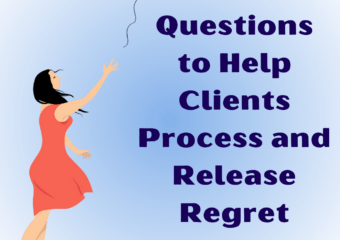When a client hits a roadblock in therapy, it’s sometimes because they’re actively trying to avoid stirring up (or even talking about) painful memories or emotions. Now of course, it’s understandable why most clients skirt around painful topics to some extent . . . . . . but as we know, it can also become […]
Helping Clients Make Meaning Out of Loss
When a client experiences a significant or sudden loss, it can feel all-consuming . . . . . . especially when they start to sift through the layers of emotion that so often accompany grief. So how might you help a client process those intense emotions, so that they can begin to make meaning out […]
Three Questions to Help Clients Process and Release Regret
When regret takes hold, many clients spiral into self-criticism and self-blame . . . . . . and too often, it becomes a debilitating loop that only deepens their regret. But according to Ron Siegel, PsyD, there are three key questions you might ask to help your client begin to disrupt this cycle and release […]
Pat Ogden, PhD’s Go-To Strategies for Working with Clients who Please & Appease
In the aftermath of trauma, getting to the heart of your client’s pain can be complex – especially when that client is caught in a defense response pattern that trauma researchers often identify as please and appease. For many clients, chronic people-pleasing bleeds into every relationship. . . . . . and when that includes […]
Four Key Components of Confronting a Narcissistic Personality – with Ellyn Bader, PhD
When it comes to confronting a client’s pattern of narcissism or grandiosity, it’s safe to say you might meet with some pushback along the way. So to up your chances of success (and also mitigate the risk of damage to the therapeutic relationship), it can be helpful to pad your treatment plan with a few […]




